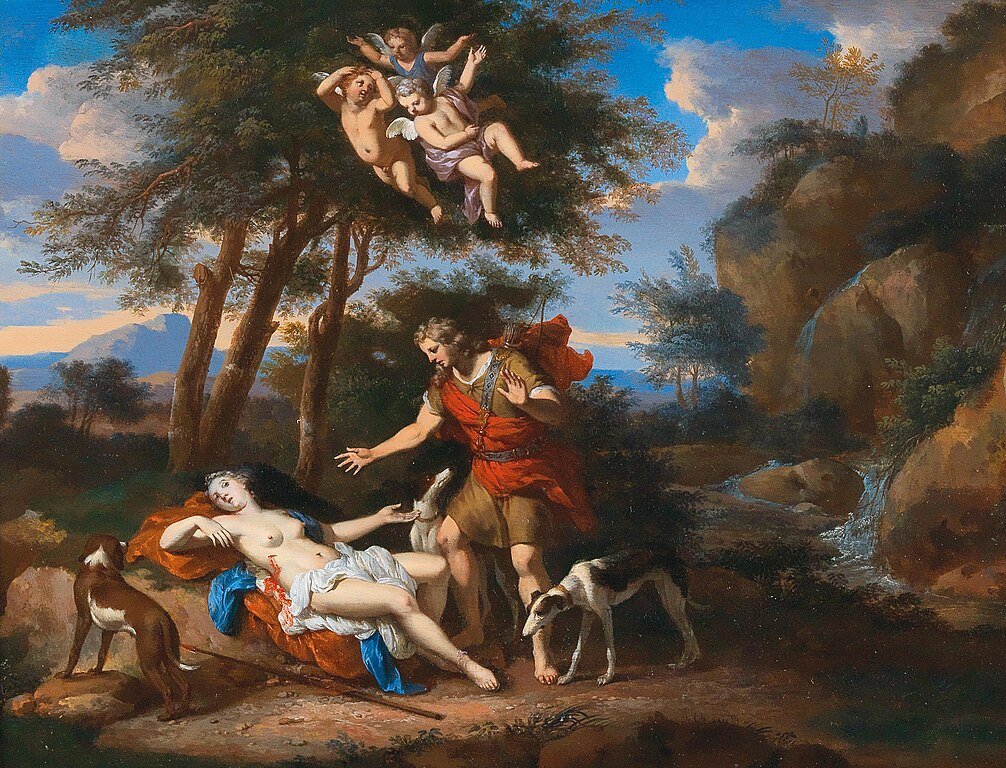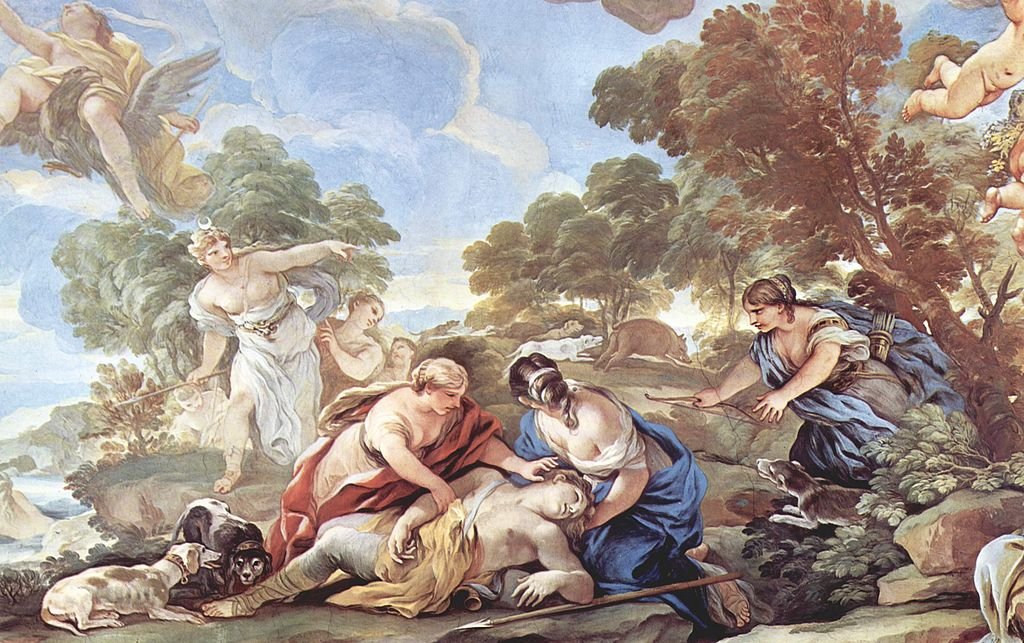Among the renowned tales of Greek mythology, the myth of Adonis and Aphrodite stands as a popular favorite. Adonis, a mere mortal, held a unique place in the heart of the goddess of love, Aphrodite, a privilege shared by only one other, Anchises, the father of Aeneas.

However, the myth of Adonis and Aphrodite was uniquely cherished, with a depth and tenderness that transcended time and beings, be they human or divine. From the moment their gazes met for the first time to the final exhale of Adonis, and perhaps even beyond, the bonds of their affection endured, leaving an indelible mark on the ancient love stories.
The Characters
Adonis: He was the mortal lover of both the goddess Aphrodite and Persephone in Greek mythology. Possessing extraordinary beauty, he held a special place in the heart of Aphrodite. Adonis’ origin was intertwined with a tale of forbidden love, as he emerged from the union of Smyrna (Myrrha) and her own father, Theias, the king of Syria.
Aphrodite: She is the ancient Greek goddess of sexual love and beauty, akin to the Roman Venus. Her essence primarily revolves around love, fertility, and at times, the realm of marriage.
Persephone: In Greek Mythology, Persephone is the daughter of Zeus, the principal deity of Greek religion, and Demeter, the goddess of agriculture. She is renowned as the wife of Hades, the ruler of the underworld.
The Beginning of The Myth of Adonis and Aphrodite
The tale of Aphrodite and Adonis weaves a classic narrative of desire and rejection, enriched by captivating nuances surrounding the Goddess of Love and Lust, Aphrodite, and the attractive mortal Adonis. Adonis, a veritable embodiment of masculine allure, found his destiny entwined with his irresistible physical charm.
Within this myth, two distinct narratives concerning Adonis and Aphrodite emerge: one chronicling Adonis’ formative years, and the other centering on his demise and Aphrodite’s pivotal role.
The initial myth of Aphrodite and Adonis delves into the roots of their relationship, a saga filled with themes of beauty, love, and envy. Adonis’ mother, the stunning Myrrha or Smyrna, was entangled in this intricate tale of forbidden love. King Cinyrus of Cyprus was ironically the father of Adonis from Myrrha, his own daughter. The birth of Adonis was a result of the scheming of the envious Goddess Aphrodite, who orchestrated a union between Myrrha and her own father.
This intricate scheme ended badly. Upon learning of the deception, Cinyrus pursued Myrrha, intent on killing both the young woman and her unborn child. However, Aphrodite repented her actions and transformed Myrrha into a myrrh tree and hid the baby.
Dispute of Persephone And Aphrodite over Adonis
Aphrodite concealed the infant Adonis within a chest, which she entrusted to Persephone, the sovereign of the underworld. Yet, when Persephone openned the chest, she was captivated by the child’s beauty and declined to return him to Aphrodite. Despite the goddess of love descending into the Underworld herself to negotiate for Adonis’ release from the realm of the deceased, Persephone remained steadfast in her desire to keep Adonis..
The clash between these two deities, representing love and death, found resolution through the intervention of Zeus. He proclaimed that Adonis would spend a portion of the year with Persephone in the underworld and another with Aphrodite in the realm above. Consequently, during his time in the underworld, winter enveloped the land, while his return to land heralded the flourishing of spring and summer upon the Earth.
In this version of the myth, the rivalry between Aphrodite and Persephone over Adonis vividly mirrors the age-old battle between love and death, a recurring theme in Greek Mythology as seen in the tale of Persephone and Hades.
In “Dialogues of the Gods” by the satirical writer Lucian, Aphrodite takes center stage in various dialogues. In one amusing exchange, she voices her grievances to Selene, the moon goddess, complaining that Cupid’s arrow is the cause of Persephone’s affection for Adonis, leading to an unexpected sharing of his love between them.
Zeus’ ruling that Adonis should divide his time between the underworld and the surface world reflects a quintessential Greek myth that symbolizes the cyclical concept of seasonal vanishing and revival, personifying the alternating rhythms of spring and winter.
The Death and Rebirth of Adonis
In an alternate version of the ancient tale of Aphrodite and Adonis, an intriguing theme of jealousy and vengeance is woven into the narrative. Ares, the formidable God of War becomes jealous upon learning of Aphrodite’s affection for the young Adonis.

Aphrodite‘s relentless pursuit of Adonis stems from her desire to become his companion, yet Adonis is more interested in the thrill of the hunt. Despite Aphrodite’s passionate effort, Adonis stands resolute, even as Aphrodite predicts a tragic incident in the future. Disregarding Aphrodite’s advice, Adonis is killed while engaged in a hunt, falling victim to a wild boar that was none other than the deity Ares in disguise.
In the wake of Adonis’s demise, Aphrodite’s grief knew no bounds. She rushes to his side in her celestial chariot drawn by swans, cursing both the Fates and Ares for orchestrating his untimely end. With Adonis cradled in her arms, Aphrodite transforms the drops of his spilled blood into vibrant windflowers, also known as anemones, which become a symbol of their love and loss.
From the very essence of Adonis, anemones spring forth, their fleeting beauty echoing the ephemeral nature of life. Adonis’s spirit retreats to the realm of the underworld, but Zeus, moved by Aphrodite’s sorrow, orders that Adonis should split his existence, spending half the year in the realm of the dead and the other half among the living.
Other Lovers
Adonis also garnered the affection of other deities, including Apollo, Heracles, and Dionysus. His demeanor was marked by androgyny: while he exhibited masculine ardor for Aphrodite, he assumed a more receptive, feminine stance in his connection with Apollo. The narrative of Heracles’ infatuation with Adonis is briefly alluded to by Ptolemy Hephaestion.
The account suggests that due to Heracles’ fondness for Adonis, Aphrodite imparted the centaur Nessos with the means to trap him. Another tradition maintains that Dionysus, the Greek deity associated with wine and ecstasy, spirited Adonis away.
Summary
The myth of Aphrodite and Adonis stands as a symbol of love. It encompasses two tales, one tracing Adonis’ origins, the other his demise underpinning themes of beauty, love, and fate.
Adonis, conceived from a complicated parentage involving Myrrha and King Cinyrus of Cyprus, beckons the intertwined forces of beauty, love, and jealousy. His concealment by Aphrodite, and her dispute with Persephone, reflect the interplay of life and death.
An alternate version introduces the wrath of Ares, who, envious of Aphrodite’s affection for Adonis, orchestrates his tragic demise, torn between love and vengeance. Adonis’ tragic death leads to his annual sojourn between the realms of the living and the dead, emblematic of nature’s cyclical rhythm.
This myth, with its dynamic interplay of love, jealousy, and fate, serves as a poignant allegory of the natural world’s eternal ebb and flow. Adonis, embodying the spirit of grain crops, aligns with the earth’s cycles of decay and revival, a timeless narrative resonating through art and culture.
Festival of Adonia
The Myth of Adonis and Aphrodite inspired the Adonia festival, an annual midsummer celebration by Greek women. This festivity, observed since Sappho’s era in the seventh century BC, gained prominence in Athens around the mid-fifth century BC. Women would create a “garden of Adonis,” a miniature garden placed in baskets or shallow pottery filled with fast-growing plants like lettuce, fennel, or swift-sprouting grains such as wheat and barley at the beginning of the festival.
These gardens were then set on rooftops to bask in the summer sun, sprouting and wilting swiftly due to the heat During this cycle, the women would burn incense in Adonis’s honor, and, as the plants withered, they would publicly mourn, tearing clothes and lamenting loudly. A small Adonis statue would be carried alongside the wilted plants in a funeral procession and submerged into the sea.
Also Read: The Story of Eros and Psyche
